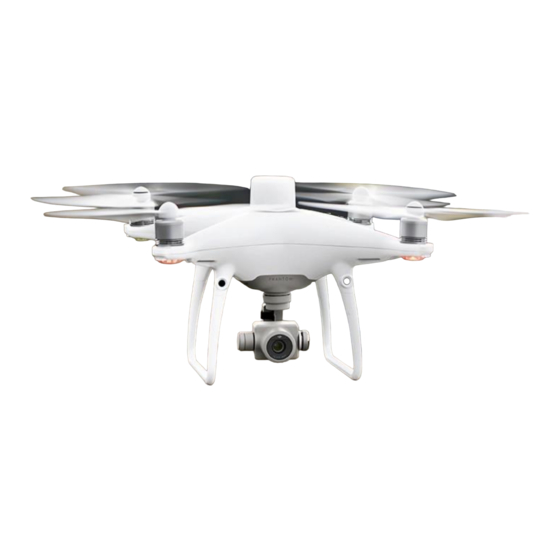dji Phantom 4 RTK Hızlı Başlangıç Kılavuzu - Sayfa 8
Quadcopterler dji Phantom 4 RTK için çevrimiçi göz atın veya pdf Hızlı Başlangıç Kılavuzu indirin. dji Phantom 4 RTK 10 sayfaları. Remote controller
Ayrıca dji Phantom 4 RTK için: Sorumluluk Reddi ve Güvenlik Talimatları (19 sayfalar), Kurulum Kılavuzu (7 sayfalar), Sıkça Sorulan Sorular Kılavuzu (17 sayfalar)

Specifications
●
Aircraft
Weight (Battery & Propellers Included)
Max Service Ceiling Above Sea Level
Max Ascent Speed
Max Descent Speed
Max Speed
Max Flight Time
Operating Temperature
Operating Frequency
EIRP
Hover Accuracy Range
Image Position Offset
●
GNSS
Single-Frequency High-Sensitivity
GNSS
Multi-Frequency Multi-System High-
Precision RTK GNSS
●
Mapping Functions
Mapping Accuracy**
Ground Sample Distance (GSD)
Acquisition Efficiency
●
Gimbal
Controllable Range
●
Vision System
Velocity Range
Altitude Range
Operating Range
Obstacle Sensory Range
Operating Environment
●
Infrared Sensing System
Obstacle Sensory Range
Operating Environment
●
Camera
Sensor
Lens
ISO Range
* supported later
** The actual accuracy depends on surrounding lighting and patterns, aircraft altitude, mapping software used, and other factors when
shooting.
1391 g
19685 ft (6000 m)
6 m/s (automatic flight); 5 m/s (manual control)
3 m/s
31 mph (50 kph) (P-mode); 36 mph (58 kph) (A-mode)
Approx. 30 minutes
32° to 104° F (0° to 40° C)
2.400 GHz to 2.483 GHz (Europe, Japan, Korea)
5.725 GHz to 5.850 GHz (United States, China)
2.4 GHz
CE (Europe) / MIC (Japan) / KCC (Korea): < 20 dBm
5.8 GHz
FCC (United States) / SRRC (Mainland China) / NCC (Taiwan, China): < 26 dBm
RTK enabled and functioning properly:
Vertical: ±0.1 m; Horizontal: ±0.1 m
RTK disabled:
Vertical: ±0.1 m (with vision positioning); ±0.5 m (with GNSS positioning)
Horizontal: ±0.3 m (with vision positioning); ±1.5 m (with GNSS positioning)
The position of the camera center is relative to the phase center of the onboard D-RTK
antenna under the aircraft body's axis: (36, 0, and 192 mm) already applied to the image
coordinates in Exif data. The positive x, y, and z axes of the aircraft body point to the
forward, rightward, and downward of the aircraft, respectively.
GPS + BeiDou + Galileo* (Asia); GPS + GLONASS + Galileo* (other regions)
Frequency Used
GPS: L1/L2; GLONASS: L1/L2; BeiDou: B1/B2; Galileo*: E1/E5
First-Fixed Time: < 50 s
Positioning Accuracy: Vertical 1.5 cm + 1 ppm (RMS); Horizontal 1 cm + 1 ppm (RMS).
1 ppm indicates error with a 1 mm increase over 1 km of movement.
Velocity Accuracy: 0.03 m/s
Mapping accuracy meets the requirements of the ASPRS Accuracy Standards for Digital
Orthophotos Class III.
(H/36.5) cm/pixel, H indicates the aircraft altitude relative to the shooting scene (unit: m)
Max operating area of approx. 1 km
approx. 5 cm/pixel, meeting the requirements of the ASPRS Accuracy Standards for Digital
Orthophotos Class III).
Pitch: -90° to +30°
≤ 31 mph (50 kph) at 6.6 ft (2 m) above ground with adequate lighting
0 - 33 ft (0 - 10 m)
0 - 33 ft (0 - 10 m)
2 - 98 ft (0.7 - 30 m)
Surfaces with clear patterns and adequate lighting (> 15 lux)
0.6 - 23 ft (0.2 - 7 m)
Surface with diffuse reflection material, and reflectivity > 8% (such as wall, trees, humans, etc.)
1'' CMOS; Effective pixels: 20M
FOV (Field of View) 84°, 8.8 mm (35 mm format equivalent: 24 mm), f/2.8 - f/11, auto focus
at 1 m - ∞
Video: 100 - 3200 (Auto), 100 - 6400 (Manual); Photo: 100 - 3200 (Auto), 100 - 12800 (Manual)
for a single flight (at an altitude of 182 m, i.e., GSD is
2
Y
X
Z
131 mm
72 mm
